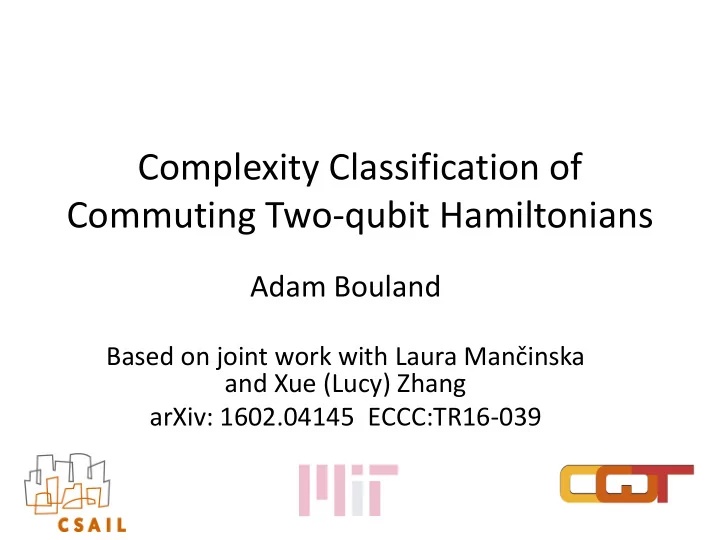

Complexity Classification of Commuting Two-qubit Hamiltonians Adam Bouland Based on joint work with Laura Mančinska and Xue (Lucy) Zhang arXiv: 1602.04145 ECCC:TR16-039
Establishing Quantum Advantage • Decision Problems – Factoring – Approximating Jones polynomial Evidence not in BPP: - No known classical algorithm Difficult to implement
Establishing Quantum Advantage • Sampling Problems – Boson Sampling [Aaronson Arkhipov] – IQP [Bremner Jozsa Montanaro Shepherd] – Many others [Knill LaFlamme] [Morimae Fuji Fitzsimons][Fefferman Umans ]… Evidence not in samp-BPP: - Not in samp-BPP unless PH collapses Possibly easier to implement This work: Classify when you get quantum supremacy for sampling
Model Hamiltonian Unitary Gate set =
Model Gate set = Goal: Classify H according the power of poly- sized quantum circuits with e^iHt gates. Which H give you advantage over classical computation?
We classify the power of commuting 2-qubit Hamiltonians =
Main Result: Dichotomy + Classification For any 2-qubit commuting H: • If H generates entanglement, then it allows to you perform hard sampling problems • Otherwise, H is efficiently classically simulable
Hard Sampling Task D Hard to sample from classically
Hard to Sample There does not exist samp-BPP algorithm M satisfying Assumption: The polynomial hierarchy doesn’t collapse
Relation to prior work Previously: Knew some commuting H allow you to perform difficult sampling tasks This work: All commuting H (other than non- entangling ones) allow you to perform difficult sampling tasks
Relation to prior work Some commuting Hamiltonians let Generic Hamiltonians are you do hard sampling tasks universal [Bremner Jozsa Shepherd ‘10] [Lloyd ‘95] Generic commuting Hamiltonians let you do hard sampling tasks [This work]
Relation to prior work
Why this matters Easier to error correct [Aliferis et al. ‘09]
Proof Outline Technique: Show postselected circuits with H are universal for BQP hardness of sampling by known techniques [Bremner Jozsa Shepherd, Aaronson Arkhipov]
Proof Outline Postselection BQP PostBQP=PP Commuting Hamiltonians Postselection PostBPP BPP
Goal: Postselected Universality • 1-qubit gates + any entangling Hamiltonian is universal [Dodd et al. ‘02, Bremner et al. ‘02] To complete proof: Get all 1-qubit gates under postselection
Goal: 1 qubit gates If H is commuting, then H=
Goal: 1 qubit gates Postselection gadget:
Goal: 1 qubit gates Suffices to show can perform all 1-qubit operations using products of L(t)’s S is a group
Goal: 1 qubit gates Suffices to show can perform all 1-qubit operations using products of L(t)’s S is a group Inverses?
Goal: 1 qubit gates How do you invert postselection?
Goal: 1 qubit gates No Solovay-Kitaev Theorem without inverses
Goal: 1 qubit gates =
Goal: 1 qubit gates L(t)’s (and their inverses) form a group & densely generate SL(2,C)
Last case This works for all entangling H except Prior work: Hard because can embed permanents in output distribution
Open problems • Complete the classification! • Extend hardness to L1 error • Classify commuting gate sets
Thanks! Questions?
Recommend
More recommend